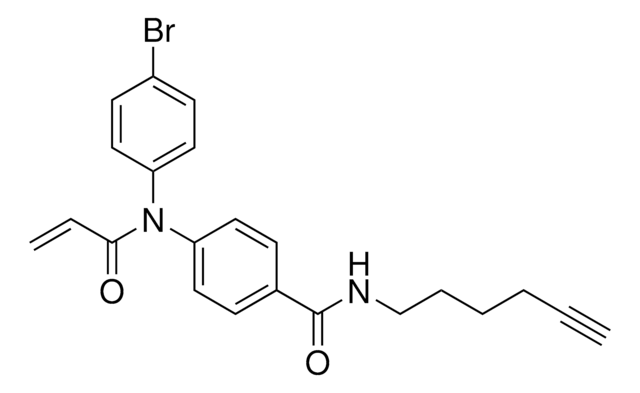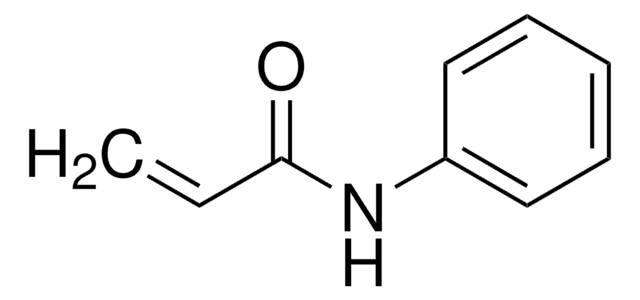Összes fotó(1)
Fontos dokumentumok
911798
N-(4-Bromophenyl)-N-phenylacrylamide
≥95%
Szinonimák:
Electrophilic scout fragment, KB05, Scout fragment for targetable cysteine
Bejelentkezésa Szervezeti és Szerződéses árazás megtekintéséhez
Összes fotó(1)
About This Item
Tapasztalati képlet (Hill-képlet):
C15H12BrNO
CAS-szám:
Molekulatömeg:
302.17
MDL-szám:
UNSPSC kód:
12352200
NACRES:
NA.22
Forma:
(Powder or crystals or solid or chunks)
Teszt:
≥95%
Javasolt termékek
Minőségi szint
Teszt
≥95%
Forma
(Powder or crystals or solid or chunks)
tárolási hőmérséklet
2-8°C
SMILES string
Brc1ccc(cc1)N(c2ccccc2)C(=O)C=C
InChI
1S/C15H12BrNO/c1-2-15(18)17(13-6-4-3-5-7-13)14-10-8-12(16)9-11-14/h2-11H,1H2
Alkalmazás
N-(4-Bromophenyl)-N-phenylacrylamide is a cysteine-reactive small-molecule fragment for chemoproteomic and ligandability studies for both traditionally druggable proteins as well as ″undruggable,″ or difficult-to-target, proteins. This fragment electrophile, or ″scout″ fragment, can be used alone in fragment-based covalent ligand discovery or incorporated into bifunctional tools such as electrophilic PROTAC® molecules for targeted protein degradation as demonstrated by the Cravatt Lab for E3 ligase discovery.
Egyéb megjegyzések
Jogi információk
PROTAC is a registered trademark of Arvinas Operations, Inc., and is used under license
kapcsolódó termék
Product No.
Leírás
Árazás
Tárolási osztály kódja
11 - Combustible Solids
WGK
WGK 3
Válasszon a legfrissebb verziók közül:
Analitikai tanúsítványok (COA)
Lot/Batch Number
Nem találja a megfelelő verziót?
Ha egy adott verzióra van szüksége, a tétel- vagy cikkszám alapján rákereshet egy adott tanúsítványra.
Már rendelkezik ezzel a termékkel?
Az Ön által nemrégiben megvásárolt termékekre vonatkozó dokumentumokat a Dokumentumtárban találja.
Xiaoyu Zhang et al.
Nature chemical biology, 15(7), 737-746 (2019-06-19)
Ligand-dependent protein degradation has emerged as a compelling strategy to pharmacologically control the protein content of cells. So far, however, only a limited number of E3 ligases have been found to support this process. Here, we use a chemical proteomic
Keriann M Backus et al.
Nature, 534(7608), 570-574 (2016-06-17)
Small molecules are powerful tools for investigating protein function and can serve as leads for new therapeutics. Most human proteins, however, lack small-molecule ligands, and entire protein classes are considered 'undruggable'. Fragment-based ligand discovery can identify small-molecule probes for proteins
Tudóscsoportunk valamennyi kutatási területen rendelkezik tapasztalattal, beleértve az élettudományt, az anyagtudományt, a kémiai szintézist, a kromatográfiát, az analitikát és még sok más területet.
Lépjen kapcsolatba a szaktanácsadással








